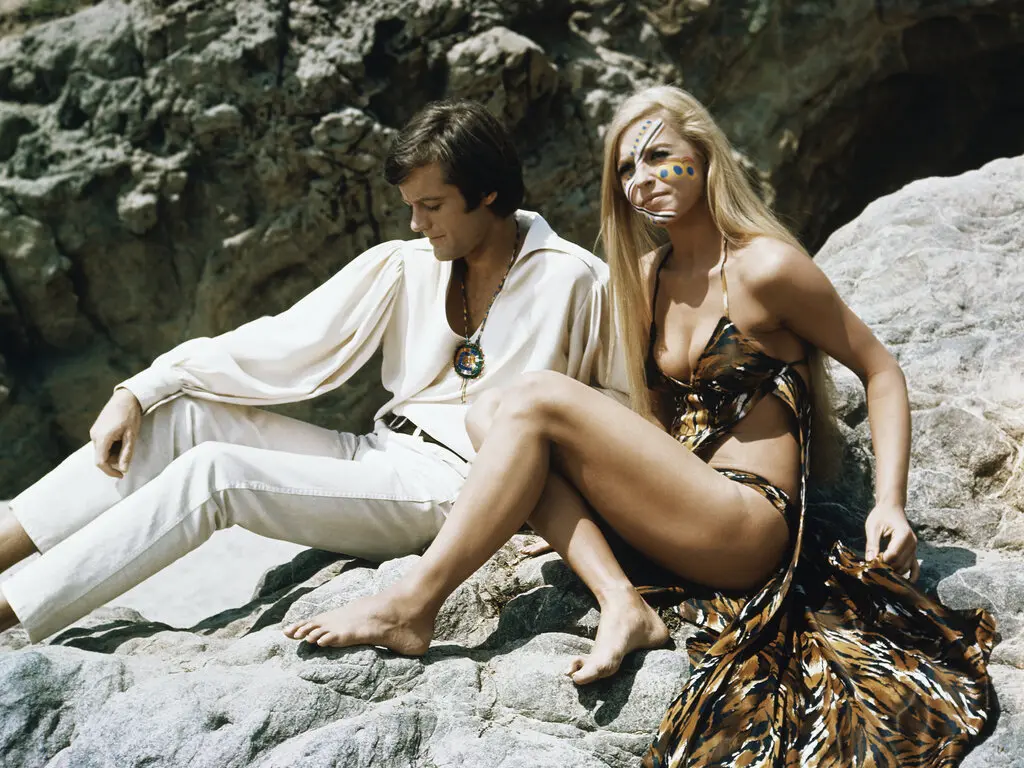Roger Corman, who for decades dominated the world of B movies as the producer or director of countless proudly low-budget horror, science fiction and crime films, died on Thursday at his home in Santa Monica, Calif. He was 98.
His death was confirmed in a statement by his family posted late Saturday on his official Instagram page.
Mr. Corman produced more than 300 films and directed roughly 50 of them, including cult classics like “A Bucket of Blood” (1959), “The Masque of the Red Death” (1964), “The Wild Angels” (1966) and the original “The Little Shop of Horrors” (1960), which he shot for $35,000 in two days on a set left over from somebody else’s movie.

When he got tired of directing, he opened the door to Hollywood for talented young protégés like Francis Ford Coppola (“Dementia 13”), Martin Scorsese (“Boxcar Bertha”), Jonathan Demme (“Caged Heat”), Peter Bogdanovich (“Targets”) and Ron Howard (“Grand Theft Auto”).
Mr. Corman “was able to nurture other talent in a way that was never envious or difficult but always generous,” Mr. Scorsese said of him. “He once said: ‘Martin, what you have to get is a very good first reel, because people want to know what’s going on. Then you need a very good last reel, because people want to hear how it all turns out. Everything else doesn’t really matter.’ Probably the best sense I have ever heard about the movies.”
Among the others Mr. Corman nurtured was Jack Nicholson, who was 21 when Mr. Corman gave him his first movie role, the lead in “The Cry Baby Killer” (1958), and 23 when he had a small part as a masochistic dental patient in “The Little Shop of Horrors.” Before he went on to stardom, Mr. Nicholson acted in eight Corman movies and wrote three of them, including “The Trip,” an uncautionary tale about LSD.

Bruce Dern and Peter Fonda were also part of the Corman repertory company, working together in “The Trip” and “The Wild Angels.” An unknown Robert De Niro played Shelley Winters’s heroin-addicted son in “Bloody Mama” (1970). The first script by Robert Towne, who later went on to write the Oscar-winning screenplay for “Chinatown,” was Mr. Corman’s nuclear-catastrophe love triangle, “The Last Woman on Earth” (1960). In order to earn his fee, Mr. Towne was also required to play the movie’s second lead, a handsome young man who is killed by the Last Woman’s jealous husband.
In addition to being remembered for the opportunities he gave young filmmakers, Mr. Corman was renowned for his ability to make movies with almost no money and even less time. In 1967, for example, Boris Karloff owed Mr. Corman two days’ work. According to Mr. Bogdanovich, “Roger said: ‘I want you to take 20 minutes of Karloff footage from “The Terror,” then I want you to shoot 20 more minutes with Boris, and then I want you to shoot another 40 minutes with some other actors over 10 days. I can take the 20 and the 20 and the 40, and I’ve got a whole new 80-minute Karloff film.’”
How The Times decides who gets an obituary. There is no formula, scoring system or checklist in determining the news value of a life. We investigate, research and ask around before settling on our subjects. If you know of someone who might be a candidate for a Times obituary, please suggest it here.
played an aging horror film star who confronts a deranged Vietnam veteran on a murderous rampage at a drive-in theater where one of his movies is playing.
From 1954 to 1970, Mr. Corman produced or directed dozens of movies for American International Pictures, most of them on a handshake deal with the fabled B-movie impresario Samuel Z. Arkoff. Budgets started at $29,000. “The Wild Angels,” considered a big movie, cost $360,000.
Bringing Bergman to the Drive-In
In 1970 Mr. Corman formed his own production and distribution company, New World Pictures. What he did next surprised Hollywood: He became the American distributor of Ingmar Bergman’s “Cries and Whispers.” The film earned Bergman nominations for Academy Awards in 1974 as writer and director; its cinematographer, Sven Nykvist, won an Oscar.
In his autobiography, “How I Made a Hundred Movies in Hollywood and Never Lost a Dime” (1990, with Jim Jerome), Mr. Corman explained that he did not want his new company “to be identified, even stigmatized, by exploitation filmmaking.” So he booked Bergman into drive-ins, and New World went on to distribute films by Akira Kurosawa, François Truffaut and Federico Fellini.

“Cries and Whispers” made a profit of more than $1 million in American theaters. Nonetheless, the name Roger Corman forever remained, in the words of the film critic David Thomson, “a synonym for blithe exploitation.”
Roger William Corman was born on April 5, 1926, in Detroit. The son of an engineer, he assumed that he would be an engineer, too.
Even during the Depression, his parents, William and Anne (High) Corman, and their two sons — Roger was 18 months older than his brother, Gene — lived comfortably. But his father had to take a major cut in pay, and to Roger it was obvious that the wolf was lurking around the next corner.
“I have always assumed that somehow shaped my attitude toward money,” Mr. Corman reflected in his autobiography.
Driven west by the harsh Michigan winters, the family moved to Southern California. After excelling at Beverly Hills High School, Roger spent a year as an engineering student at Stanford University in the middle of World War II, then spent his sophomore and junior years at the University of Colorado as a cadet in a Navy program.
He returned to Stanford when the war ended, graduating in 1947 with a degree in industrial engineering. But after working for just four days as an electrical engineer, he quit engineering forever.
He was hired as a messenger at 20th Century Fox for $32.50 a week and eventually rose to story reader. But, he wrote in his memoir, “I knew I was going to be a writer, producer or director of motion pictures, and I needed more background in the arts of the 20th century.” He enrolled at the University of Oxford on the G.I. Bill to study the work of T.S. Eliot and D.H. Lawrence.
After six months at Oxford and six months in Paris, he came home and sold a chase-across-the-desert script to Allied Artists for $3,500. He was so unhappy with the finished film, “Highway Dragnet,” directed by Nathan Juran, that he decided to become his own producer.
An Inauspicious Start
With the $3,500, a borrowed one-man submarine and $6,500 raised from a dozen friends, he was almost ready to film “Monster From the Ocean Floor,” a movie about a man-eating mutant spawned by atomic testing. But he needed another $2,000 and a director. He got both by offering the directing job to a young actor, Wyott Ordung, if Mr. Ordung, who also appeared in the film, would put up the last $2,000.
On his first few movies, Mr. Corman produced, thought up the story, drove the equipment truck and filled in as a stunt driver. Knowing nothing about directing but needing another outlet for his energy, he became his own director in 1955 with “Five Guns West.” For the next 15 years, he directed almost all the films he produced.
He earned his first taste of respectability and the favor of European critics with a series of horror films based on Edgar Allan Poe stories, most of them starring Vincent Price. The series began with “House of Usher” in 1960, with a script by the science-fiction writer Richard Matheson, and culminated in 1964 with “The Masque of the Red Death,” photographed by Nicolas Roeg, and “The Tomb of Ligeia.”

Mr. Corman liked to call himself an outlaw filmmaker, and many of his movies celebrated outlaws: Peter Fonda as the head of a nihilistic motorcycle gang in “The Wild Angels,” with real Hells Angels riding their choppers alongside the actors; and Shelley Winters as the incestuous head of a murderous family in “Bloody Mama.”
In preparation for “The Trip” (1967), he spent seven hours hugging the ground beneath a redwood tree in Big Sur while tripping on LSD for, he said, the first and only time.
“The Wild Angels,” “Bloody Mama” and “The Trip” were all denounced by critics, and they all made money. One of Mr. Corman’s few commercial failures was his most deeply felt film, “The Intruder” (1962), the story of a rabble-rousing white supremacist. Mr. Corman gave the role of the Northern bigot who spreads hatred in a Southern town to a young stage actor, William Shatner. When no studio agreed to be his partner, Mr. Corman, a self-proclaimed lifelong liberal, provided most of the $80,000 budget and distributed “The Intruder” himself.
New World, New Honors
By 1970, Mr. Corman was burned out by directing and by his peripatetic bachelor life. That summer he completed the last movie he would direct for 20 years, “Von Richthofen and Brown,” about the World War I German flying ace known as the Red Baron and the Allied pilot who shot him down. (His next directorial effort, the 1990 science fiction-horror hybrid “Frankenstein Unbound,” was also his last.)

On Dec. 26, 1970, at the age of 44, Mr. Corman married Julie Halloran, a former Los Angeles Times researcher whom he had been dating off and on for six years. With his wife and his brother as co-producers, he formed New World Pictures.
At New World, he was responsible for “The Student Nurses,” “Private Duty Nurses” and “I Never Promised You a Rose Garden,” an intelligent and disturbing adaptation of Hannah Green’s semi-autobiographical novel about a teenage girl with schizophrenia, which received an Academy Award nomination for its screenplay, by Gavin Lambert and Lewis John Carlino.
He sold New World in 1983, keeping the valuable film library, and promptly created a new production and distribution company, Concorde-New Horizons. In 1997 he sold Concorde-New Horizons and its library for $100 million.
He is survived by his wife, Julie, and his daughters. Catherine and Mary, according to the statement from his family.
Mr. Corman remained active into the 21st century. He produced for Netflix “Splatter” (2009), a three-part online horror series with a difference: Audience votes determined which characters would be killed. He produced intentionally cheesy monster movies like “Sharktopus” (2010), “Piranhaconda” (2012) and “CobraGator” (2016) for the Syfy channel.
He received an honorary Oscar in 2009, and in 2011 he was the subject of a well-received documentary feature, “Corman’s World: Exploits of a Hollywood Rebel,” directed by Alex Stapleton.
Interviewed by The Hollywood Reporter in 2013, Mr. Corman was philosophical about his life’s work. “Motion pictures have always been part art and part business,” he said. “If I have a burning vision, it’s to keep on working.”










